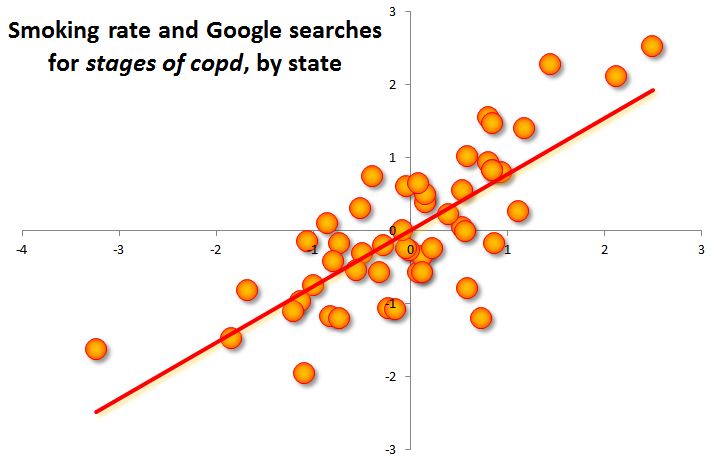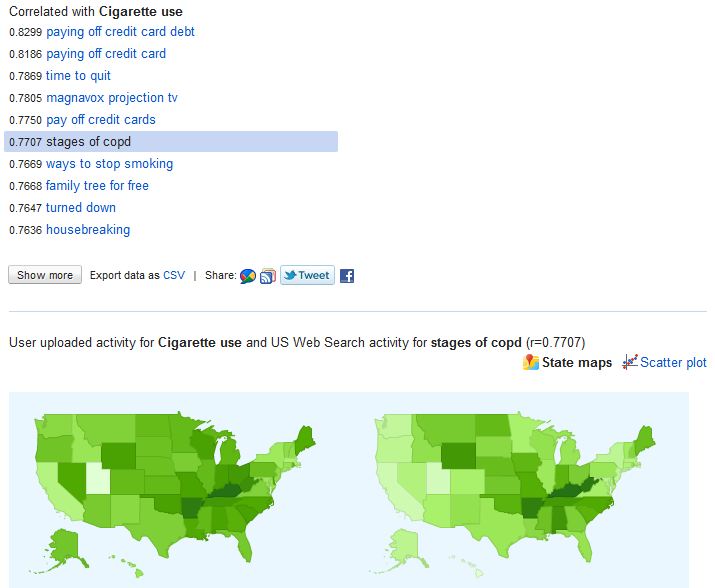If I ran the Federal scary anti-smoking image warning program, I might show smokers the list of health-related terms that show up most in the states with the highest cigarette smoking rates.
If you take the smoking rates by state, and throw them into the Google Correlate hopper, you can see the 100 search terms that are most highly correlated with that reported smoking behavior. That is, the terms that are most likely to be used in high-smoking states and least likely to be used in the low-smoking states.
Is the result just a lot of noise? Maybe, but I don’t think so. Here are the smoking-related terms in the top 100:
- camel no 9
- cigarette coupon
- cigarette coupons
- marlboro coupons
- my time to quit
- safe cigarettes
- stopping smoking
- time to quit
- fire safe cigarettes
- ways to stop smoking
So that’s good for face validity — a list of random search terms isn’t likely to have all those smoking terms on it.
But after the smoking terms, the thing that jumps out is the health-related terms. We know from the Google flu tracker that people search for their symptoms. So these caught my eye.
Here is a screen shot of the first page of results:
I selected “stages of copd” as the term to map. The map on the left is the smoking rates; the one on the right is the relative frequency of searches for “stages of copd.” That is, chronic obstructive pulmonary disease, a nasty disease the most common cause of which is smoking.
Here is the complete list of health-related terms among the top-100 correlates with smoking rates:
- stages of copd
- abnormal mammogram [the association between smoking and breast cancer remains controversial]
- aneurysm symptoms [more common among smokers]
- hardening of the arteries [exacerbated by smoking]
- jaw swelling
- red rash on legs [could be psoriasis, which smoking increases the risk of]
- swelling in neck
- swollen lymph node in neck
- pilonidal cyst pictures
Lymph node swelling, which is implicated in the jaw and neck searches, most often reflects infection — which smoking causes.
How strong are the connections? They’re not the strongest I’ve seen on Google Correlate. The “stages of copd” search is correlated with smoking rates at .77 on a scale of 0 to 1. It’s not uncommon to find correlations of .93 (which is the relationship between “quiche” and “volvo v70 xc”).
But considering the smoking rates come from a sample survey (the National Survey on Drug Use and Health) which includes random error, and states are somewhat arbitrary geographic units, that correlation seems pretty high to me. Here’s the scatterplot:
 What is the correlation causality story here? I can’t say. But the simplest explanation is that these are the terms smokers (and maybe those who know or care for them) are most likely to Google relative to non-smokers — not that they are the most common searches smokers do, of course, but the searches that differentiate them from non-smokers. The simplest explanation is the best place to start.
What is the correlation causality story here? I can’t say. But the simplest explanation is that these are the terms smokers (and maybe those who know or care for them) are most likely to Google relative to non-smokers — not that they are the most common searches smokers do, of course, but the searches that differentiate them from non-smokers. The simplest explanation is the best place to start.
I like this list of conditions because in my experience smokers sometimes have the attitude of “you have to die of something.” But it’s not just the chance of dying that smoking increases — it’s a lot of possible forms of suffering along the way.
——————————
The Google Correlate tool is showing the great potential for using Internet search activity to investigate layers of behavior and meaning behind other observable social phenomena, such as race/ethnic composition, health behavior, and family patterns.


Comments 6
Andrew 苏安德 Salman — August 31, 2011
Oh the sun shines bright, on my old Kentucky home~~
Anna Geletka — August 31, 2011
I'm not sure why pilonidal cyst is on the list here. I could find no reports that correlated this condition (cyst at the base of the tailbone) with smoking.
SB — August 31, 2011
I would like to offer that factors for those health risks reach beyond tobacco use and second hand smoke. After a quick search-
"Journal of Community Health published a study that found people who live
near mountaintop removal coal mines have cancer rates twice as high as
people living elsewhere in Appalachia. Last month, a peer-reviewed study linked mountaintop removal mining to high rates of birth defects. And in February, a study pegged the public health costs of coal in Appalachia at about $80 billion a year."
http://www.loe.org/blog/blogs.html?seriesID=1&blogID=17
Niki — September 1, 2011
Isn't this all kind of...obvious? I mean, what was the point of this study - to show whether people who participate in an activity are more likely to seek out information related to that activity or effects associated with it? I mean, duh.
Patrick — September 1, 2011
From a med student (who is trying to quit)- the only time tobacco catches anyone's attention in class is when a disease is brought up and they mention that cigarettes DON'T cause it. And, fun note, smokers are much less likely to have Ulcerative Colitis. Wonder if there's a correlation with fewer google searches in these states?
Podlix — January 5, 2024
Podlix Flum Pebble Flavors is a cutting-edge vaping device designed to offer a seamless and enjoyable experience for vaping enthusiasts. Crafted with precision, this device combines sleek design with advanced technology, making it an ideal choice for both beginners and experienced vapers.
The Podlix Flum VapeFlum Pebble Flavors modernity, while its user-friendly interface ensures straightforward operation.